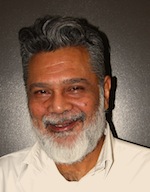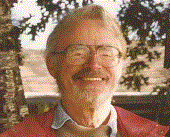
Vernon Lomax Smith is an American economist who is currently a professor of economics and law at Chapman University. He was formerly the McLellan/Regent’s Professor of Economics at the University of Arizona, a professor of economics and law at George Mason University, and a board member of the Mercatus Center. Along with Daniel Kahneman, Smith won the 2002 Nobel Memorial Prize in Economic Sciences for his contributions to behavioral economics and his work in the field of experimental economics, which helped establish “laboratory experiments as a tool in empirical economic analysis, especially in the study of alternative market mechanisms”.
Andrew B. Whinston, is an American economist and computer scientist. He serves as the Hugh Roy Cullen Centennial Chair in Business Administration and works as a Professor of Information Systems, Computer Science, and Economics, and Director of the Center for Research in Electronic Commerce (CREC) in the McCombs School of Business at the University of Texas at Austin.

Ariel Rubinstein is an Israeli economist who works in economic theory, game theory and bounded rationality.

Kenneth George "Ken" Binmore, is an English mathematician, economist, and game theorist, a Professor Emeritus of Economics at University College London (UCL) and a Visiting Emeritus Professor of Economics at the University of Bristol. As a founder of modern economic theory of bargaining, he made important contributions to the foundations of game theory, experimental economics, evolutionary game theory and analytical philosophy. He took up economics after holding the Chair of Mathematics at the London School of Economics. The switch has put him at the forefront of developments in game theory. His other interests include political and moral philosophy, decision theory, and statistics. He has written over 100 scholarly papers and 14 books.
Lionel Wilfred McKenzie was an American economist. He was the Wilson Professor Emeritus of Economics at the University of Rochester. He was born in Montezuma, Georgia. He completed undergraduate studies at Duke University in 1939 and subsequently moved to Oxford that year as a Rhodes Scholar. McKenzie worked with the Cowles Commission while it was in Chicago and served as an assistant professor at Duke from 1948 to 1957. Having received his Ph.D. at Princeton University in 1956, McKenzie moved to Rochester where he was responsible for the establishment of the graduate program in economics.

Sir Richard William Blundell CBE FBA is a British economist and econometrician.

Leonid Hurwicz was a Polish–American economist and mathematician, known for his work in game theory and mechanism design. He originated the concept of incentive compatibility, and showed how desired outcomes can be achieved by using incentive compatible mechanism design. Hurwicz shared the 2007 Nobel Memorial Prize in Economic Sciences for his seminal work on mechanism design. Hurwicz was one of the oldest Nobel Laureates, having received the prize at the age of 90.

Pradeep Dubey is an Indian game theorist. He is a Professor of Economics at the State University of New York, Stony Brook, and a member of the Stony Brook Center for Game Theory. He also holds a visiting position at Cowles Foundation, Yale University. He did his schooling at the St. Columba's School, Delhi. He received his Ph.D. in applied mathematics from Cornell University and B.Sc. from the University of Delhi. His research areas of interest are game theory and mathematical economics. He has published, among others, in Econometrica, Games and Economic Behavior, Journal of Economic Theory, and Quarterly Journal of Economics. He is a Fellow of The Econometric Society, ACM Fellow and a member of the council of the Game Theory Society.
Matthew Owen Jackson is the William D. Eberle Professor of Economics at Stanford University, an external faculty member of the Santa Fe Institute, and a fellow of CIFAR.
Larry Samuelson is the A. Douglas Melamed Professor of Economics at Yale University and one of the faculty of the Cowles Foundation of Yale University.
Gary Charness was Professor of Economics and the Director of the Experimental and Behavioral Economics Laboratory in the Department of Economics at the University of California, Santa Barbara. Charness was an economist and social scientist, specializing in experimental and behavioral work; at the time of his death he was ranked 3rd in the world by RePEc in the field of experimental economics and had published nearly 120 academic articles. Charness was a contributor to several areas of economic research, including social preferences, identity and group membership, communication and beliefs, behavioral interventions, group decision-making, social networks, gender, and individual decision-making. Gary was known for his youthful spirit throughout his career, inspiring and motivating researchers worldwide across various fields. Remarkably, he began his Ph.D. at the age of 40 and published his first paper at 50. Despite starting his academic journey later in life, Gary managed to publish around 100 papers between the ages of 50 and 70, establishing himself as one of the leading researchers in experimental economics. A centerpiece of his research has been to affect beneficial social outcomes in difficult economic environments. Charness's work has been discussed and published in The New York Times and Science, as well as other media outlets. Charness was married and had three children.

James Patrick Quirk was a Caltech professor of economics.
Pascaline Dupas is a French economist whose research focuses on development economics and applied microeconomics, with a particular interest in health, education, and savings. She is a professor in economics and public affairs at Princeton University and is a co-chair of the Poverty Action Lab's health sector. She received the Best Young French Economist Prize in 2015.
Georg Nöldeke is an economist and currently serves as Professor of Economics at the University of Basel. His research interests focuses on microeconomic theory, game theory, and social evolution. In 2007, Georg Nöldeke's contributions to economics of information - in particular on the communication within financial markets - as well as to game theory and contract theory were awarded the Gossen Prize by the German Economic Association.

The Princeton University Department of Economics is an academic department of Princeton University, an Ivy League institution located in Princeton, New Jersey. The department is renowned as one of the premier programs worldwide for the study of economics. The university offers undergraduate A.B. degrees, as well as graduate degrees at the Ph.D. level. It is often considered one of the "big five" schools in the field, along with the faculties at the University of Chicago, Harvard University, Stanford University, and MIT. According to the 2023-2024 U.S. News & World Report, its graduate department is ranked as the joint No. 4 in the field of economics, in a four-way tie between it, the University of Chicago, Yale University, and the University of California, Berkeley.
Edi Karni is an Israeli born American economist and decision theorist. Karni is the Scott and Barbara Black Professor of Economics at Johns Hopkins University. He is a Fellow of the Econometric Society and an Economic Theory Fellow of the Society for the Advancement of Economic Theory.
Kate Ho is the John L. Weinberg Professor of Economics and Business Policy at Princeton University. Her research focuses on the industrial organization of the medical care market.
Gilat Levy is an Israeli economist, researcher and council member. She has previously worked as a lecturer at Tel Aviv University at the Berglas School of Economics. Levy also held a role at Princeton as a Visiting Fellow prior to her arrival at the London School of Economics in 2008 as a full-time professor.
Johannes Hörner is a French-German economist and currently Alfred Cowles Professor of Economics at Yale University. His research focuses on microeconomics and game theory.
The 2021 Nobel Memorial Prize in Economic Sciences was divided one half awarded to the American-Canadian David Card "for his empirical contributions to labour economics", the other half jointly to Israeli-American Joshua Angrist and Dutch-American Guido W. Imbens "for their methodological contributions to the analysis of causal relationships." The Nobel Committee stated their reason behind the decision, saying:
"This year's Laureates – David Card, Joshua Angrist and Guido Imbens – have shown that natural experiments can be used to answer central questions for society, such as how minimum wages and immigration affect the labour market. They have also clarified exactly which conclusions about cause and effect can be drawn using this research approach. Together, they have revolutionised empirical research in the economic sciences."







